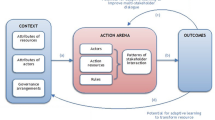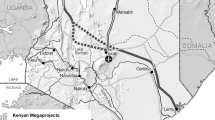Abstract
How are development policies, prepared by donors, translated into practice in different social settings? Many modalities are used, but we consider bilateral projects to be a conduit for value change and sustainable development. Our case concerns two bilateral projects with Nepali and international technical advisors. The article discusses the complex scenario that technical advisors must navigate to broker policy ideals into practice. They must respect the intentions and regulatory and normative frameworks of the donor and recipient governments, and the local cultures and realities of the local governments and villagers with whom they work. At the same time, they promote value change in support of gender equality and human rights. This also raises the question of whose values count—those of the donor, Nepalese Government, local participants or the advisors? We argue that technical assistance has an indispensable role in facilitating sustainable, equitable and inclusive rural development outcomes in socio-culturally difficult operational environments.
Résumé
Comment les politiques de développement, élaborées par les bailleurs de financement, sont-elles traduites dans la pratique dans différents contextes sociaux? De nombreuses modalités sont utilisées, mais nous considérons que les projets bilatéraux sont un vecteur de changement de valeur et de développement durable. Notre cas concerne deux projets bilatéraux avec des conseillers techniques népalais et internationaux. L’article traite du scénario complexe que doivent suivre les conseillers techniques pour négocier la mise en pratique des idéaux politiques. Ils doivent respecter les intentions et les cadres réglementaires et normatifs des gouvernements bailleur et récipiendaire, ainsi que les cultures et réalités locales des gouvernements locaux et des villageois avec lesquels ils travaillent. Dans le même temps, ils encouragent le changement de valeur en faveur de l’égalité des sexes et des droits humains. Cela soulève également la question de savoir quelles sont les valeurs qui comptent - celles du bailleur de financement, du gouvernement népalais, des participants locaux ou des conseillers? Nous soutenons que l’assistance technique a un rôle indispensable à jouer pour faciliter un développement rural durable, équitable et inclusif dans des environnements opérationnels difficiles sur le plan socioculturel.


Similar content being viewed by others
Notes
As of August 2018, the National Penal Code of Nepal will contain clause 168 (3), which states that the act of discrimination by keeping menstruating females or women who have delivered a baby in a Chhaupadi, or other inhuman behaviour such as not touching, to be criminal offenses, and clause 168(4), which states that the penalty will be imprisonment of up to 3 months or 3000 rupees, or both.
References
Aasland, A. and M. Haug. 2008. Social exclusion in Nepal - stronger or weaker? Norwegian Institute for Urban and Regional Research, Working Paper 2008:115.
Arora-Jonsson, S. 2012. Gender, development and environmental governance: Theorizing connections. New York: Routledge.
Behrends, A., S-J. Park and R. Rottenburg. 2014. Travelling models: Introducing an analytical concept to globalisation studies. in Travelling Models in African Conflict Management. Brill Online.
Cleaver, F. 2012. Development through bricolage: Rethinking institutions for natural resources management. London: Routledge.
de Albuquerque, C. and V. Roaf. 2013. On the right track: Good practices in realising the rights to water and sanitation. United Nations Special Rapporteur on the human right to safe drinking water and sanitation, Lisbon, Textype.
Gibson, C., K. Andersson, E. Ostrom, and S. Shivakumar. 2005. The Samaritan’s dilemma: The political economy of development aid. Oxford: Oxford University Press.
Government of Nepal. 2016. Nepal Water Supply, Sanitation and Hygiene Sector Development Plan (2016—2030). Ministry of Water Supply and Sanitation Sector Efficiency Improvement Unit (SEIU).
Haapala, J., Rautanen, S.L., White, P., Keskinen, M. and Varis, O. 2016. Facilitating bricolage through more organic institutional designs? The case of water users’ associations in rural Nepal. International Journal of the Commons 10(2).
Haapala, J. and P. White. 2015. Why do some behaviours change more easily than others? Water use behaviour interventions in rural Nepal. Waterlines, 34(4).
Hänninen, E. 2014. Legitimating aid: Donors and policy making in the rural water supply and sanitation sector in Nepal. Doctoral Thesis. Publication of the Department of Political and Economic Studies 14 (2014), University of Helsinki
Koponen, J., M. Suoheimo, S. Rugumamu, S. Sharma, and J. Kanner. 2012. Finnish value-added: Boon or bane to aid effectiveness?, 170. Erweko Oy: Ministry for Foreign Affairs of Finland.
Leder, S., F. Clement, and E. Karki. 2017. Reframing women’s empowerment in water security programmes in Western Nepal. Gender and Development 25 (2): 235–251.
Mayer, M. 2017. “They come from above” exploring Finnish development cooperation in the field of meteorology, 1968–2015. Doctoral Thesis. University of Helsinki.
Meier, B., G. Kayser, J. Kestenbaum, U. Amjad, F. Dalcanale, and J. Bartram. 2014. Translating the human right to water and sanitation into public policy reform. Science and Engineering Ethics 20: 833–848.
Merry, S.E. 2006. Human rights and gender violence—Translating international law into local justice, 264. Chicago and London: The University of Chicago Press.
Ministry for Foreign Affairs of Finland. 2012. Finland’s development policy programme - Government decision-in-principle, 16 February 2012.
Ministry for Foreign Affairs of Finland. 2016. Finland’s development policy: one world, common future—Toward sustainable development, Government’s Report to Parliament, 4 Feb 2016, Government Publications, Helsinki
Mosse, D. 2005. Cultivating development: an ethnography of aid policy and practice. London: Pluto.
Mosse, D. 2011. Introduction: The anthropology of expertise and professionals in international development. In Adventures in Aidland: The anthropology of professionals in international development, ed. David Mosse, 1–31. Oxford: Berghahn Books.
Odén, B. and L. Wohlgemuth. 2011. Where is the Paris Agenda heading? Changing relations in Tanzania, Zambia and Mozambique. ECPDM Briefing Note No. 21, February 2011.
Olivier de Sardan, J.-P. 2005. Anthropology and development. Understanding contemporary social change. London: Zed Books. ISBN 9781842774175.
Regmi, S., and B. Fawcett. 1999. Integrating gender needs into drinking-water projects in Nepal. Gender and Development 7 (3): 62–72.
Rural Water Supply and Sanitation Project - Western Nepal HRBA and GESI Strategy and Action Plan. 2015. Human rights-based approach and gender equality and social inclusion in the water and sanitation sector. RWSSP-WN/DoLIDAR, Nepal. http://www.rwsspwn.org.np/#!phase-ii-publications/ck0f.
Rural Water Supply and Sanitation Support Programme, Nepal, Phase III (RWSSSP III). 2005. Completion report. Kathmandu. December 2005
Rusca, M., and K. Schwartz. 2014. ‘Going with the Grain’: accommodating Local Institutions in Water Governance. Current Opinion in Environmental Sustainability 11: 34–38.
Scott, W.R. 2008. Approaching adulthood: the maturing of institutional theory. Theory and Society 37: 427–442.
Stirrat, R.L. 2000. Cultures of consultancy. Critique of Anthropology 20 (1): 31–46.
Tandon, R. 2010. Whose values count? Voice, values and exclusion in capacity-development processes: experiences from India. In Capacity development in practice, ed. J. Ubels, N. Acquaye-Baddoo, and A. Fowler. Washington: Earthscan.
Udas, P., and M. Zwarteveen. 2010. Can water professionals meet gender goals? A case study of the Department of Irrigation in Nepal. Gender and Development 18 (1): 87–97.
United Nations General Assembly, A/64/292. The human right to water and sanitation. 28 July 2010.
Vikman, H. 2011. Mid-term Review of the Strengthening of the Rural Water Supply and Sanitation Project in Western Nepal (RWSSP-WN), MFA Finland
Welber, E. 2012. Contextualizing Gender Equality and Social Inclusion in the WASH Sector. Locating RWSSP-WN’s local level goals in larger frameworks, RWSSP-WN website
White, P. 2015. The spectrum of motivations, expectations and attitudes in technical development cooperation. Forum for Development Studies 42 (1): 89–112.
White, P., I.R. Badu, and P. Shrestha. 2015. Achieving sustainable water supply through better institutions, design innovations and Water Safety Plans—the experience from far west Nepal. Journal of Water, Sanitation and Hygiene for Development 5 (4): 625–631.
Wilson, G. 2007. Knowledge, innovation and re-inventing technical assistance for development. Progress in Development Studies 7 (3): 183–199.
Acknowledgements
We are grateful for the participation of the key informants and project staffs, and the travel grant received from ‘Maa- ja vesitekniikan tuki ry’.
Author information
Authors and Affiliations
Corresponding author
Rights and permissions
About this article
Cite this article
White, P., Haapala, J. Technical Advisors as Brokers: Translating Gender Equality and Human Rights Policies and Values into Practice in the Water Sector in Nepal. Eur J Dev Res 31, 643–662 (2019). https://doi.org/10.1057/s41287-018-0173-0
Published:
Issue Date:
DOI: https://doi.org/10.1057/s41287-018-0173-0




